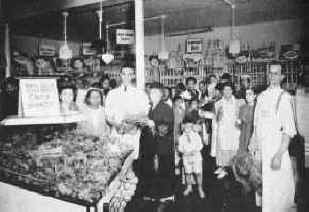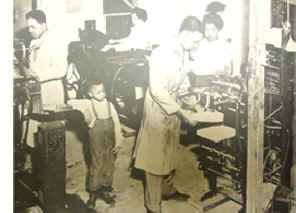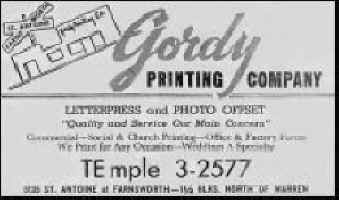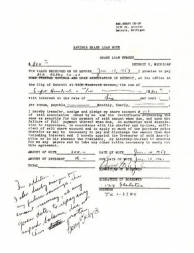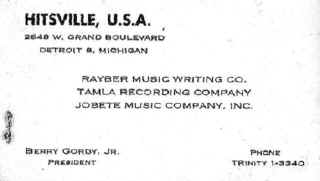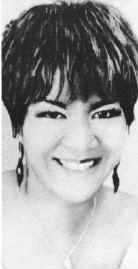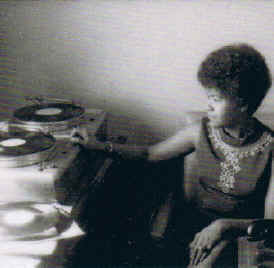Berry Gordy's Motown
Records
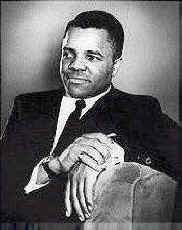
Founder and owner of the Tamla-Motown family record labels, Berry
Gordy, Jr., established Motown Records as one of the most
important independent labels in the early '60s. Assembling an
industrious staff of songwriters, producers, and musicians,
Motown Records built one of the most impressive rosters of artist
in the history of pop music and became the largest and most
successful independent record company in the United States by
1964.
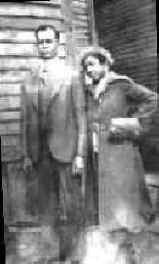
Berry Sr. and Bertha Gordy
1922
|
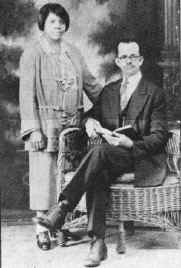
Berry Sr. and Bertha Gordy 1923
|
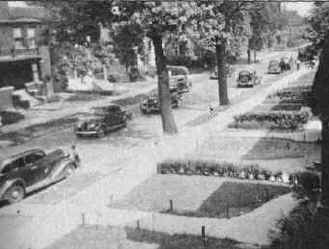
Home on Roosevelt in Detroit where
the Gordys live in the 20s and 30s
|
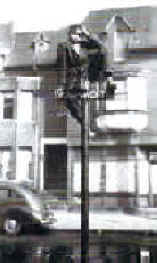
St. Antoine and Farnsworth
|
On Thanksgiving day, November 28,
1929 Berry Gordy was born at Detroit's Harper Hospital. Gordy was
the seventh child born to Berry and Bertha Gordy. The Gordys were
an ambitious middle class with roots in Georgia farming and
retailing. The family moved to Detroit from Sandersville, Georgia
in 1922. Sandersville, Georgia with their first three children.
It was here that they established a successful construction,
painting and printing business that allowed the family to
purchase a commercial building on the corner of St. Antoine and
Farnsworth Berry Gordy Sr also opened the Booker T. Washington
grocery store. From it he instilled the values of frugality,
discipline family unity and hard work that were so dear to Booker
T. Washington. After the children were grown Bertha would study
business at Wayne State University and University of Michigan.
Finally graduating from Detroit Institute of Commerce Bertha
would go on to co-found the Friendship Mutual Life Insurance
Company.
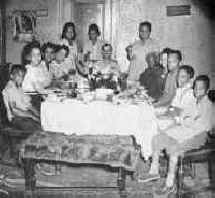
The Gordy's in their apartment
L to R: Berry Jr, Loucye, Gwen, Anna, Esther,
Berry Sr, Marie Boddie
(friend), Grandma Lucy Hellum Gordy, cousin Evelyn Turk,
Fuller, George, Robert.
|
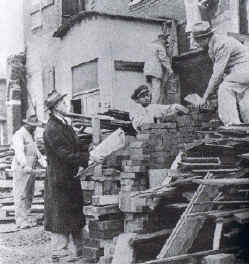
Gordys working construction
L to R: Berry Sr., Robert and Berry Jr.
|
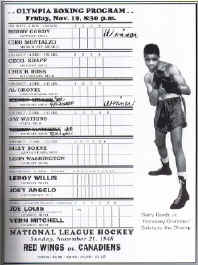
Olympia Boxing Program 11/19/48
|
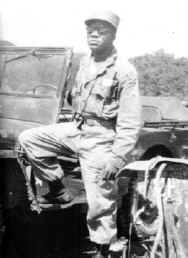
In Korea
|
As a youth, playing Berry's
Boogie, Gordy won a semi-final of a boogie-woogie piano contest
at the Michigan Theater. Ultimately he lost to a five year old
prodigy named Sugar "Chile" Robinson.
Gordy dropped out of school in the
eleventh grade to become a professional boxer. One time he
even fightimg on the same card as the Brown Bomber Joe Lewis at
Detroit's Olympia Stadium. He ended a respectable career as a
featherweight winning thirteen of nineteen professional bouts. In
1950 after serving in the army in Fort Keep, Arkansas; Fort
Custer, Michigan and Korea from 1951 -1953. He returned to
Detroit and in the summer of 1953 with personal savings, his Army
discharge pay, a $700 loan from his father and brother George,
opened the 3-D Record Mart: The House That Jams Built..
Obsessed with his love of jazz, Gordy was too stubborn to stock
the blues records that the neighborhood wanted. The result was
the stored failed, and for awhile after he sold Guardian Service
Cookware.
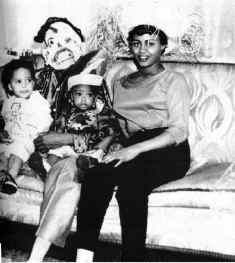
Halloween 1957
L to R: Hazel Joy, Berry, Berry IV, Thelma
Berry married Thelma Crawford and quickly had
three children. It was after closing the store that Gordy, with
the help from his mother-in-law, went to work Ford in the
foundry. which after one day quit. Next his mother-in-law got him
a job on the assembly line as upholstery trimmer at the Ford
Lincoln-Mercury plant in Wayne, MI earning $86.40 a week. By 1957
he had quit that job to become a professional songwriter.
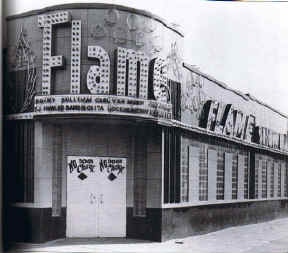
Flame Show Bar
|
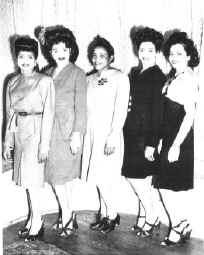
L to R: Esther, Anna, Bertha, Gwen
and Loucye Gordy
|
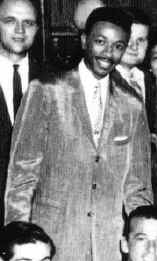
Roquel "Billy" Davis aka
Tyran Carlo
|
The Flame how Bar opened in 1949 and was
located on the corner of John R and Canfield. The Flame was
a Black and Tan, a showplace for Black talent in Detroit during
the 50s. Billie Holiday, T-Bone Walker, Wynonie Harris were just
a few of the many great Black entertainers that appeared there.
The Berry's were in charge of the cigarette and photo concessions
there. Sisters Gwen and Anna took the photos with brothers George
and Robert developing the film. It was at this time that Al Green
the Flame's owner who he managed Jackie Wilson nvited Gordy to
write Wilson . Gordy teaming with Roquel "Billy"
Davis aka Tyran Carlo began writing at Green's office.
Eventually sister Gwen would be brought in and they would write
To Be Loved," Lonely Teardrops," "That's Why (I
Love You So)" and "I"ll Be Satisfied. Established
as hit writers Gordy started doing some producing.
In late 1957, Gordy had his first success with
"Reet Petite" which was recorded by Detroit born Jackie
Wilson who had at one time replaced Clyde McPhatter as lead
singer of the Dominoes. The next year he wrote "Lonely
Teardrops" for Wilson.57
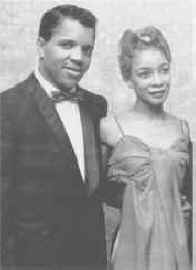
Berry and Raynoma Gordy
|
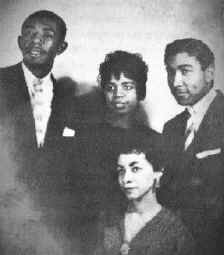
The Rayber Voices
L - R: Robert Bateman, Gwen Murray, Brian Holland. Front:
Raynoma Gordy
|
One day in 1958, Gordy met Raynoma
Liles after she had won a talent contest at a Detroit nightclub.
After the emcee recommendation, she and her sister auditioned for
Gordy. Not only did Gordy meet his next wife Raynoma, but he
found a woman who could help him write hit records. Known around
the company as Miss Ray, she had perfect pitch and could write
lead sheets. They soon formed the Rayber Voice Recording Company.
For $100 they would do whatever was necessary to help a young
singer make a record. With a second hand disc making machine, a
rented studio at United Sound, he would cut records for them on
their Rayber Records label. Eventally he would hire Al Abrams to
work as a promoter. From writing, arranging rehearsing or
recording a demo. In this way they were able to find new talent.
They also put together the Rayber Voices, a studio group that
backed most of Motown's first acts early recordings.lppppp
An unsuccessful audition of the Matadors for
Wilson's manager Nat Tarnopol would change Gordy's life. Berry
really liked them and told them so after the audition. This would
be the beginning of a close friendship between Gordy and the
Matador's lead singer Smokey Robinson. The Matador;s soon changed
their name to the Miracles. Gordy managed the Miracles and
produced their 1958 single Got A Job on the End Record
label. The small royalty check ($3.19) he received from End
and other similar for all hits he had co-written convinced him to
start his own label Tamla. Originally he had wanted to call it
Tammy after the Debbie Reynolds ballad, but the name had already
been taken.
With the $800 loan from the
family Ber-Berry Co-Op , Gordy started Talma Records.
In 1959 he made a $300 down payment toward a total price of
$23000 For a house at 2648 West Grand Boulevard.. Living upstairs
with his second wife Raymona he converted the downstairs into and
office suite and the basement a recording studio. He also started
a second label Motown Records. Motown Records Inc. Porch
Hitsville USA
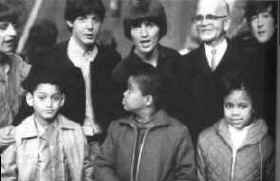
With the Beatles
Back Row (L-R) Ringo Starr, Paul McCartney, George Harrison,
Berry Gordy Jr,. and John Lennon
Front row (L-R) Terry Gordy, Berry Gordy IV and Hazel Joy Gordy
In 1959 Gordy started his own publishing
company Jobete Publishing named after his three children Hazel
Joy, Berry and Terry. If you wrote for Motown you were published
by Jobete which grew to be one of the most powerful in the
industry.

Al Abrams
In 1959, Al Abrams, Gordy's promotion man from
Rayber Records, became Motown's first white employee. Young
and inexperienced he was soon switched from promotion to
overseeing Motown's early public relations. He became national
sales manager and promotion director in 1961.
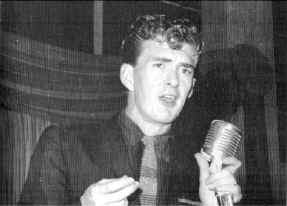
Tom Clay |
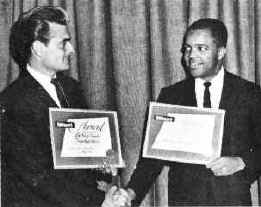
Barney Ales and Berry Gordy
|
In 1959, Barney Ales who worked as sales manager for a local
record distributor Aurora Distributing, met Gordy through
local white deejay Tom Clay. Ales would arguably
become Motown's most important White executive. Entering the
record business in 1955 as a representative for Capitol Records,
he moved the next year to Warner Brothers Records before becoming
a partner in a local distributor ship. In all these jobs Ales
acted as a laison between record labels, radio stations and
distrubutors in the Midwest.
Ales was an aggressive distributor the type that was key to
small record companies. Ales sold to the local distributors who
in turn arranged airplay and sold to retail. Below them were the
one-stops (minidistributors) who sold to the small retailers that
wanted only a few copies of a record.
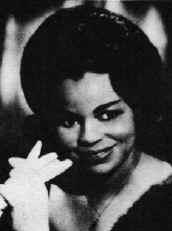
Loucye Gordy Wakefield
Gordy had been using B&H, a local Detroit distributor.
B&H's specialty was R&B while Ales handled everything.
Realizing Ales had the best connections with the one-stops and
could get his records promoted on white stations, Gordy soon
persuaded him to join the company. In 1959, Ales became an
unpaid advisor to Gordy and sister Loucye in billing. Ales, in
addition the sales and promotion was assigned to collecting the
receivables.
In 1960, Ales was hired as vice president of sales and
ditribution. All most of all Motown's distributors and their
promotion staff were white as were the executives. This would
become an issue by the end of the 60s as black power movement
grew.
Motown
Exectives
|
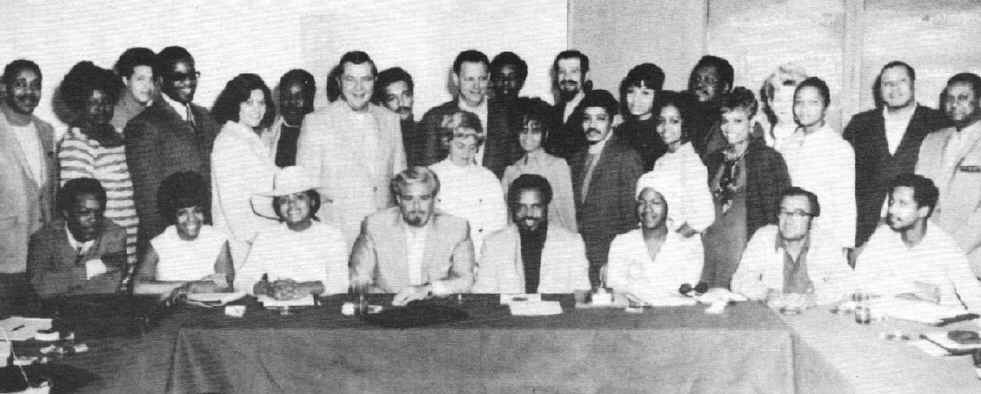
Seated from left:
producer-songwriter Frank Wilson, Claudette Robinson,
production president Suzanne de Passe, head of sales
Barney Ales, Berry Gordy, Billy Jean Brown, Ralph Seltzer
and Robert Bullock. Second row from left:
unidentified, secetary Rebecca Jiles, engineer Clavin
Harris, unidentified, salesman Tom Noonan, A&R Betty
Ocha, Raynoma Gordy Singleton, Jobete's Mike
Ossman, Iris Gordy-Bristol, tape-librarian Fran
Heard-Maclin. To[p row, frm left: Tony Jones,
unidentified, unidentified, promotion Phil Jones,
promotion Larry Maxwell, sales director Ak Klein, Pat
Cosby and producer husband Hank Cosby, unidentified
Photo courtesy Billie Jean Brown
|
"First of all I made the money, it's my
money. I do what I want with it. Black people have shown a lack
of understanding of what I'm doing as a general market business
man Why do I hire this white man, or why this or why that.
Because the white man can do it better than I can do it."
Berry Gordy
While the Gordys were Motown's first inner
circle, Gordy brought in a group of Detroit music veterans to
form the next layer of management.
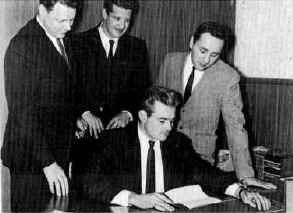
L to R: Phil Jones, Al Klein,
Barney Ales, Irv Biegal
|
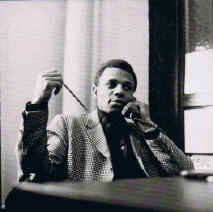
Miller London
|
By 1962, Ales had hired Irv Biegel and Phil
Jones. Biegal was assigned him to singles sales and promotion
with Jones doing the same with albums. In 1963 Al Klein was
recruited to hand singles and sales in the South. In October
1969, Miller London was hired as Motown's first Black salesman.
Ales continued to hire blacks into the sales including Ralph
Thompson in 1970, first in regional in regional sales, he later
would became Ales assistant. Joining as a stock clerk in 1971,
Alvin Jones moved to regional sales the next year and ended up
Motown's last president before it was sold in 1988.
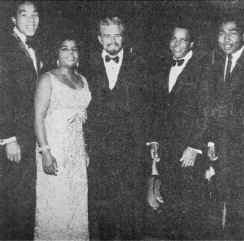
L to R: William "Smokey"
Robinson, Esther Gordy Edwards, Barney Ales, Berry Gordy, Eddie
Holland
Initially Motown's executives were Gordy president with three
vice presidents, his sister Esther Gordy Edwards, William
"Smokey" Robinson, Barney Ales.and Eddie Holland.

Ralph Seltzer
|
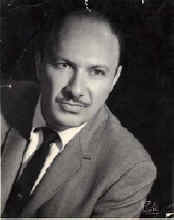
Harry Balk
|
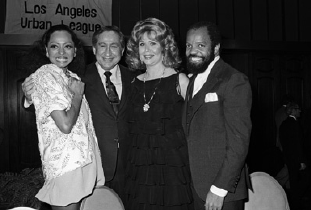
Diana Ross, Michael Roskind, his
wfe and Berry Gordy |
While the Gordys were Motowns first inner circle, Gordy
brought in a group of Detroit white music industry veterans to
form the next layer of management. These were lawyer Ralph
Seltzer, a friend of Ales as Vice President of Corporate Affairs
and special assistant to Gordy; Harry Balk - Executive Director
of Detroit office; and Michael Roskind vice president and CEO.
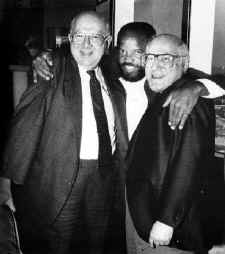
The Novicks
L to R: Harold Novick, Berry Gordy, Sidney Novick
Sidney Novick, an accountant, superseded George
Edwards. He was the chief supervisor of Motown and Jobetes books.
His brother Harold. a tax attorney, was an important consultant
that ran Motown's New York office. Another lawyer Ed Pollack
filled a number of administrative positions.
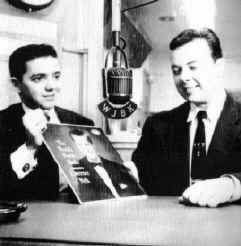
Gordon Prince on the left was part of
promotion and went on to became national sales manager.
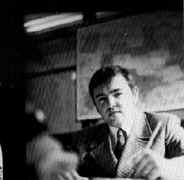
Mike Luska
Michael Luska was with Motown from 1969-1982. He
started a regional salesmanger. In 1971 was promoted to national
sales manager and finally became executive vice-president of
sales and marketing in 1979.
Billie
Jean Brown
Photos courtesy Billie Jean Brown
|
Billy Jean Brown, an attorney, initially was
hired as the company librarian, but six months later was
elevated to head of quality control.

William "Mickey" Stevenson
William Mickey Stevenson as A&R man. His
responsibilities were to supervise musicians, producers and
writers. He assigned producers to acts, made sure songs were
written on time and produced when deadlines had to be met and he
didn't have anyone to take the assigment. In the early days his
most imprtant job was to build Motown's session players. Working
under Stevenson was Clarence Paul.
In November 1980 Jay Lasker was brought in to be
Motown's president. He would be fired in 1987.

In 1996 Shelly Berger was hired by Ralph Selzer
to manage ITM. His job was to find music, television, and film
tie-ins for Motown artist. He was the Supremes tour manager.
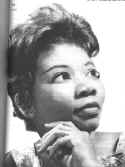
Mabel John |
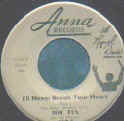
Money |
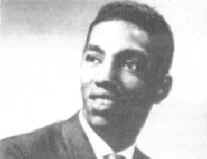
Barret Strong |
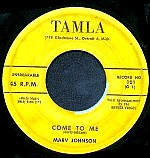 |

Marv Johnson |
Gordy initially recorded R&B artists on Tamla Records. He
signed Mabel John, the gospel trained sister of blues singer
Little Willie John. Gordy scored a minor hit with Tamla's first
release, R&B singer Marv Johnson's "Come To Me." As
the record picked up steam Gordy found he could not keep up with
the demands of national production and distribution and leased
the master to United Artists. Later in the first year of
operation he co-wrote and produced "Money," which was
recorded by Barrett Strong. Not yet equipped to break a national
hit "Money" was released by Anna Records which
was owned by his sister Gwen and her husband Harvey Fuqua.
"Money" eventually reached the number two spot on the
R&B Chart. In November 1959, Gordy recorded "Bad
Girl" by a young William "Smokey" Robinson and the
Miracles that reached number ninety-three on the pop charts with
the help of national distribution by Chess Records.
Smokey Robinson convinced Gordy that Motown should distribute its
own records. In 1960, Gordy co-wrote and distributed "Shop
Around" by Smokey Robinson and the Miracles, which was a
number one hit and established Motown as an important independent
company. By this time Gordy had set up the Motown Record
Corporation, Hitsville USA and Berry Gordy Enterprises. Jobete
Music was his publishing firm and management agency International
Talent Management, Inc. He also set up various subsidiary labels.
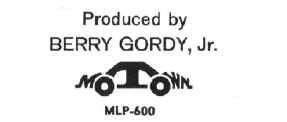
Early Motown logo from the back of the first album jacket
Through the next four years, Gordy continued to
produce hits by capitalizing on the girl group craze. In 1959, a
sixteen year old girl, Mary Wells, approached Gordy with a song
she had written for Jackie Wilson. Unable to write music, Wells
sang the song to Gordy, who immediately signed her and released
her version of "Bye, Bye, Baby," which made the Top Ten
on the R&B charts in 1960. Two years later she teamed with
Smokey Robinson, who now wrote and produced for Tamla label and
hit with "The One Who Really Loves You," "You Beat
Me To Punch," and "Two Lovers." The next year she
recorded "Laughing Boy" and "Your Old Stand
By." In 1964 Wells topped the charts with "My
Guy."
Gordy also charted with the Marvelettes. Around
1961, one of their teachers arranged an audition with Gordy,
after which he signed them and released "Please Mister
Postman," which became Motown's first number one record. The
next year the Marvelettes hit the charts with
"Playboy," "Beachwood 4-5679," "Someday
Someway," and "Strange I Know." In 1962 The group
toured the South as part of the first Motortown Revue.
Encouraged by his success with the Marvelettes, Gordy recorded
another Detroit girl group, Martha and the
Vandellas. Martha Reeves, influenced by Clara Ward and Billie
Holiday, joined with Annette Sterling, Rosalind Ashford and
Gloria Williamson sang as the Del-Phis while in high
school and record the unsuccessful "I'll Let You Know"
for Chess. In 1961 Reeves was hired as a secretary at Motown and
by 1962 had convinced Gordy to record her group. The group sang
backup vocals on a number of Motown hits including "Hitch
Hike" and "Stubborn Kind of Fellow" by Marvin
Gaye. Martha and the Vandellas hit the charts with "Come Get
These Memories," followed by the million selling "Heat
Wave" and "Quicksand." The next year they recorded
"Dancing In the Streets" which reached near the top of
the charts. Martha and the Vandellas, along with Mary Wells
and the Marvelettes, identified Motown as a major source of the
girl group sound.
Gordy the son of a black entrepreneur who hoped
for the upward mobility of blacks, specifically groomed and
cultivated streetwise teens from the streets of Detroit to make
them acceptable to Mainstream America. In 1964 he hired Maxine
Powell, who had operated a finishing and modeling school, to prep
his performers. Powell tried to transform Motown artists into
polished professionals.
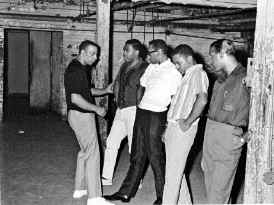
Cholly Atkins and the Four Tops
(R to L: Cholly Atkins, Lawrence Payton, Duke Fakir, Obie Benson
and Levi Stubbs)
A few months after adding Maxine Powell, Gordy hired
choreographer Cholly Atkins, a well known dancer in the 1930s and
1940s who had performed at the Cotton Club and Savoy Ballroom, to
teach these groups how to move gracefully
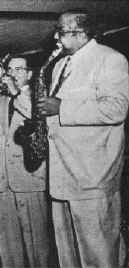
Foreground: Maurice King.
Atkins worked with Maurice King, who served as executive
musical director. King who had arranged shows at Detroit's Flame
Show Bar for years and had worked with jazz artists such as
Billie Holiday and Dinah Washington, taught the Motown groups
about stage patter.
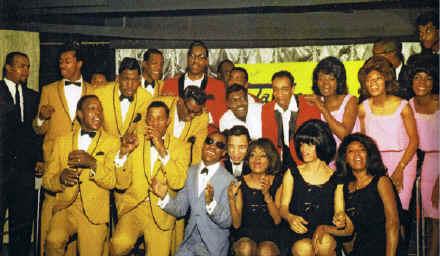
At EMI in London, March 1965
Berry Gordy,Temptation, Miracle, Stevie Wonder, Martha and and
the Vandellas, Supremes
By the mid-1960s, Gordy had assembled a Motown team that could
take poor black youths from Detroit and teach them to talk, walk,
dress as successful debutantes and debonair gentleman
Gordy combined the polished images of the Motown acts with a
gospel-based music that could appeal to mainstream America. Blues
and R&B always had a funky look to it back in those days, and
Motown wanted to have a look that fathers and mothers would want
their children to follow. They wanted to kill the imagery of
liquor and drugs and how some people thought it pertained to
R&B. Therefore when they reject anything that had a strong
blues sound to it when choosing material for their
artist.
In place of the blues and R&B, Gordy favored a distinct
music grounded by an insistent pounding rhythm section,
punctuated by horns and tambourines and featuring shrill,
echo-laden vocals that bounced back and forth in a call and
response of gospel. Building upon his experience with the girl
group sound, he produced a full sound reminiscent and expanding
on Phil Specter's Wall of Sound.

Motown complex on West Grand Boulevard
|

2657 W. Grand Boulevard
|
Motown's rapid success led to the aacquisition of
several houses on the south side of West Grand Boulevard and one
on the north side. In this panarama of the south side the
following properties can be seen from right to left from 2657
West Grand Boulevard.
2644/46 Jobete Publishing Company (now
the museum entrance). Bought 4/18/61
2648
Recording Studio (Hitsville) at the back of the building
on lower ground floor. Home of Berry and Raynoma Gordy in
upstairs. Bought 8/2/59
2650 Offices of
Berry Gordy, Esther Gordy and Ralph Seltzer. This is
vacant ground to the left of Hitsville. It burn to the
ground in 1971. Bought 1/23/62
2650 Motown
Administration. Bought 1/23/1963
2656 Motown
Finance (white front). Bought 3/4/65
2662/64 Motown Sales and Marketing.
Bought 7/11/66
2670/72 ITMI (International Talent
Management Incorporated). Bought 7/5/66
2657 Artist
Development was located directly across Grand Boulevard
from the Motown complex. Bought 1/12/66
Converting the downstairs to and office and the
basement to a recording studio.After he purchased 2644-2246 West
Grand Boulevard in April of 1961 he placed Jobete, the sales,
shipping and public relations departments in it. In January of
1962 2650-2652 West Grand Boulevard was added to house
Berry and his sister Esther's offices International Talent
Management. From 1965 on 2656 hosed finance
department; 2662-64 purchased the next year was home to the
sales and marketing. 26666-68 was bought at the same time. ITMI
was moved to 2670-72 after it was bought in late 1966. Across the
street, 2657 was converted into Artist Development Department in
early 1966.
Gordy Family Involvement
Berry Gordy Sr. - office
of the president
Bertha Fuller Gordy -
office of the president

Esther Gordy Edwards - Berry's
oldest sister. Senior vice-president of Motown Records. Known as
the company historian. Stayed in Detroit when the company
relocated to Los Angeles. Ran International Talent
Development Inc.

Anna Gordy Gaye
Anna Gordy Gaye - Sister.
Co-owner Anna Records. Married to Marvin Gaye (first wife) from
1963-1977. Artist development and songwriter.

Gwen Gordy Fuqua
Gwendolyn Gordy Fuqua - Sister.
Married Harvey Fuqua, the leader of the Moonglows and later
producer at Motown. As a songwriter she shared credits with
Berry on a number of Jackie Wilson's songs, including
"Reet Petite," "Lonely Teardrops,"
"Lonely Teardrops," and That's Why (I Love Her
So)." Co-founded Tri-Phi with her husband in 1961. Artist
development.

Loucye Gordy Wakefield - Sister.
At the time of her death in 1965, she was Vice-president of
Motown and a director of Jobete. In 1964, she developed a system
for collecting money from distributors that contributed
enormously to Motown's financial well being. In 1968, a fund was
established in her name to award $500 scholarships to financially
disadvantaged students.

Robert Gordy - Brother. Motown
executive and director of Jobete. Recorded as Robert Kayli for
Anna Records and Talla.

Fuller Gordy
Fuller Gordy - Brother. Motown
executive. Procurement.

George Gordy - Brother. Shared
credits on "Beachwood 4-5789" and "Stubborn Kind
of Fellow."
After moving in Gordy began staffing the offices. Berry Gordy Sr.
took on the role of consultant. Gordy's sister Esther Gordy
Edwards handled the daily administration while another sister
Loucye Gordy Wakefield was responsible for receivables. Gordy's
brother Robert left his post office job to become a studio
engineer.
The Berry and Raynoma were the first officers of
Tamala as president and vice president. Liles brother Mike
created payroll. Janie Bradford was the first receptionist who
were later would co-writing songs.
Aiming for the mass market, Gordy called the
music "The Sound of Young America" and affixed a sign
over Motown studio that read "Hitsville U.S.A."
Berry Gordy, using methods practiced in Detroit auto
factories, ensured the continued success of the Supremes by
assembling parts of a hit making machine, that included
standardized song writing, an in house rhythm section , a quality
control process, selective promotion and a family
atmosphere reminiscent of the paternalism of Henry Ford in his
auto plants in the early twentieth century.
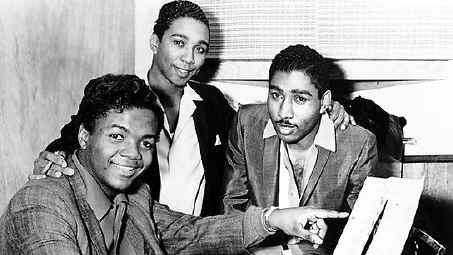
L to R: Lamont Dozier, Brian Holland,
Eddie Holland
The songwriting team of Brian Holland, Lamont Dozier and Eddie
Holland joined forces in 1962 and perfected the formula of
success that they discovered with their composition "Where
Did Our Love Go."
The different singles also sound remarkably similar because of
the in house rhythm section known as the Funk Brothers. In 1964,
Earl Van Dyke, a former be-bop jazz pianist who toured with
R&B singer Lloyd Price became the leader of the studio band.
He played with drummer Benny Benjamin and bassist James Jamerson,
who had backed Jackie Wilson and the Miracles. Together with a
few other musicians the Funk Brothers provided the trademark
percussive beat of the Motown sound
Gordy attempted to maintain consistent quality of Motown by
conducting weekly meeting that scrutinized possible releases.
Gordy carefully promoted the songs that were released through
means that kept the slick Motown image intact. Getting them spots
on "The Ed Sullivan Show," "The Dean Martin
Show," "The Tonight Show," "The Hollywood
Palace," and "Orange Bowl Parade., the Copacabana in
New York, exclusive Los Vegas hotels. He even had entertainers
such as Sammy Davis Jr. and Broadway star Carol Channing write
liner notes.
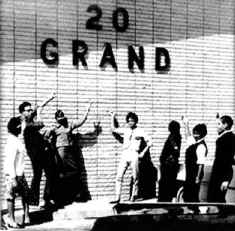
In 1960, between sets at the Twenty Grand, Gordy
met Otis Williams when he walked into the men's room. Formerly
known as the Elegants, the Questions, or the Distants,
Gordy renamed them the Temptations. Norm Whitfield, Smokey
Robinson, Holland-Dozier-Holland formed the legendary
Motown songwriting production crew.
During the mid-1960s, Gordy established a music empire
that included eight record labels, a management service, a
publishing company, and grossed millions of dollars a year
From 1964 to 1967, Motown had 14 number one pop singles, 20
number one singles on the R&B charts, forty six more Top
Fifteen pop singles and seventy-five other Top 15 R&B
singles. In 1966 alone, seventy-five percent of Motown's releases
made the charts.
In 1967 the Motown empire began to decline. A few days before
a scheduled performance by the Supremes at the Hollywood Bowl in
April, Gordy fired Florence Ballard, who had become jealous of
the increasing prominent position of Diana Ross, and replaced her
with Cindy Birdstrong. In July 1968, he fired David Ruffin of the
Temptations and hired Dennis Edwards. Gordy quarreled about
royalty rates with the the songwriting-production team of
Holland-Dozier-Holland, who quit and filed suit against Motown.

Motown's Hollywood office - 6255 Sunset
Boulevard
Suffering the departure of H-D-H, Berry Gordy began to
concentrate on the career of Diana Ross as a solo act in 1970.
Maintaining the company's success with The Jacksons, Gordy moved
Motown to Hollywood in 1971 and established Motown Industries,
expanding to Broadway musicals and films.

The Commodores
L to R: Lionel Richie, William King, Ronald LaPread,
Thomas McClary, Milan Williams Front: Walter Orange
|

The Jackson Five
L to R: Jermaine, Marlon,
Tito, Michael, Jackie
|

Rick James
|
In 1968 Gordy bought Golden World and Ric-Tic Records from
Janet Jackson and Eddie Wingate.
During the first half of the '70s, Diana Ross was established
as Motown's first all-around entertainer through her work in
super clubs and films. Motown suffered defections in the '70s
with Martha Reeves recording solo for other labels in 1974 and
The Four Tops signing with ABC/Dunhill. Gladys Knight and The
Pips recording for Buddah beginning in 1974 and, in 1975 The
Jackson Five moved to Epic, as did Michael Jackson in 1978. The
Miracles, without Smokey Robinson, switched to Columbia in 1977
and The Temptations went to Atlantic. However, Motown retained
its position as an important independent label with the
recordings of Diana Ross, Marvin Gaye, Stevie Wonder, The
Commodores, and Rick James.

Ewart Abner with Stevie Wonder
In 1975 Ewart Abner resigned as president and Barney Ales was
brought back.
In November 1980 Jay Lasker was hired to be president and was
fired in 1987.
During the '80s Motown struggled. Diana Ross moved to RCA in
1981 and Marvin Gaye signed with Columbia in 1982. The
Temptations returned as did The Four Tops by the mid-'80s. The
Gordy label introduced Debarge in 1983. The company staged a
successful 25th anniversary celebration in 1983 that was later
broadcast on ABC-TV. Motown Productions produced Lonesome
Dove for CBS-TV in 1989. However, many former
employees, including Eddie Holland and members of The Vandellas
and The Marvelettes sued Motown, alleging failure to pay
royalties.
In January 1979, Ales was let go. Ewart Abner, director of
ITMI, then became president.

Esther Gordy Edwards
|

Hitsville and Motown Museum
|

Donovan Building aka Motown Building
|
In 1985, Esther Gordy Edwards opened the Motown
Historical Museum inside the restored Hitsville building offering
tours. There were rumors that the former Motown building on
Woodward would be used as a larger museum. However it still
remains abandoned and boarded up as of the end of 2000.
In July 1987, Gordy fired Motown President Jay Lasker.
On August 21, 1987 the old Motown office building and studio
was designated a historical site by the State of Michigan and
Detroit City Council in October, 2007 renamed the stretch of West
Grand Boulevard from the John C. Lodge to Grand River Berry Gordy
Jr. Boulevard.
In July 1988 Berry Gordy sold Motown Records to MCA and Boston
Ventures for $61 million but retained Jobete the publishing arm.
Boston Ventures later bought out MCA's interest and sold Motown
Records to the Dutch-based Polygram conglomerate for $325 million
in 1993. In late 1994, Warner books published Gordy's
self-serving biography To Be Loved.
Berry Gordy was inducted into the Rock and
Roll Hall of Fame in 1990
Classic Motown






